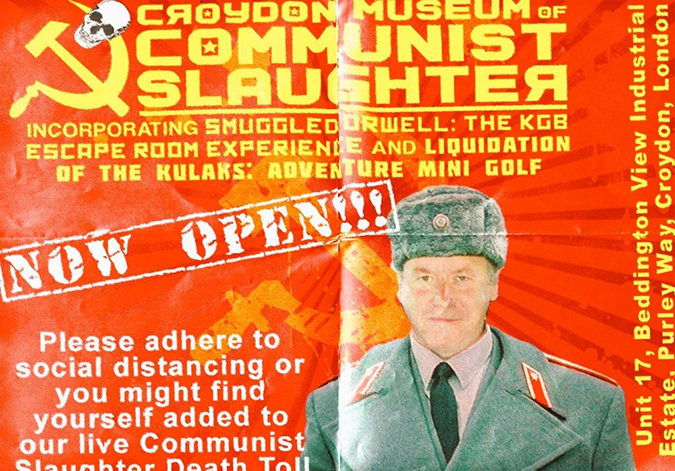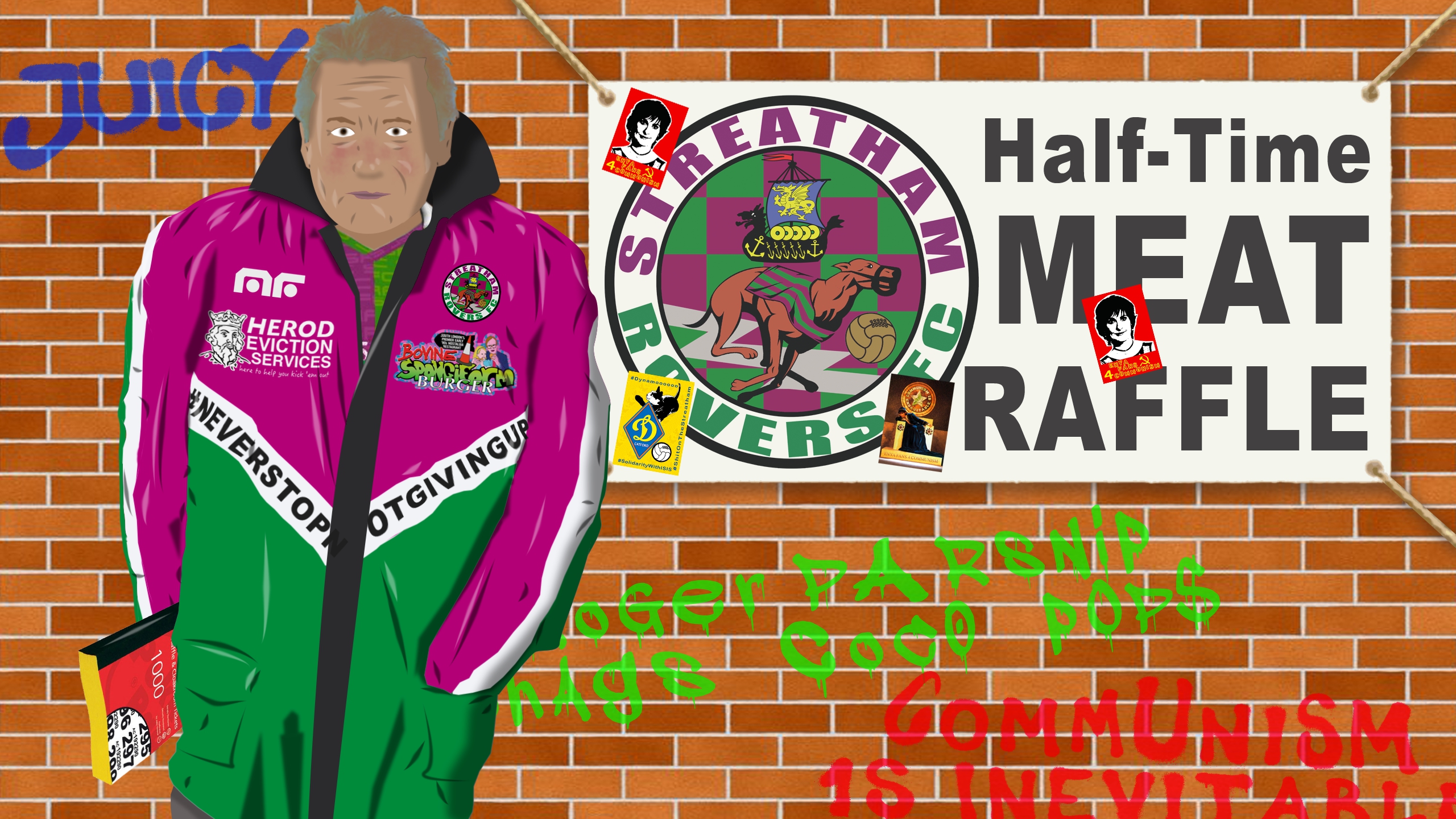EDITION: Bad New Times.
Searching for homo-authenticus, discussing immigration, Orwell, and gentrification.
Tiny lights flicker, shift, refuse to settle. Two black, blocky orbs stare out, lifeless, like an alien creature from the deepest ocean. Predatory, they belong to a weathered face, pixelated as if on an episode of Crimewatch (though in truth it’s only pixelated because this is a Zoom.us video call). Here he is, as if discovered on an archeological dig: homo-authenticus, or, in layman terms, a working-class man.
Hi. I’m Tom Knightwell. So, yeah, here comes the cliche… I’m a journalist who wants to find out what real people think about politics. Others have ventured outside of the the capital to find the authentic voices of the working-class – the Guardian’s John Harris is a master, and more recently the same paper’s North of England editor Helen Pidd has lifted the abandoned wet cardboard box of England’s social stratification to look at the creepy crawlies below, but New Socialist don’t offer such generous expenses, so I decided to find them in London. Yes, London! Curiously in the three years since I moved here (for work I hasten to add, this was no whimsical cultural decision) I hadn’t met a single working-class person. Not one. I think this says much about the metropolis’s demographics rather than any homogeneity of my social circle.
But what about the outer ring of Greater London? Boris Johnson’s two London mayoral election successes were based on the so-called doughnut strategy (because jam or custard is decadently bourgeois) so it stands to reason that the suburbs are more working-class. A 2017 London Institute of Urban Studies report actually managed to plot the border between London’s inner-city and suburbia as falling along the halfway line of the Greyhound Lane stadium non-league football club Streatham Rovers, so what better place to start then there?
I made a phonecall to the club’s chairman, Spenser Carlyle. After several minutes demanding to know how I got his number and what exactly I’m investigating, he puts me in touch with the club’s board member for youth, community and schools engagement, Roger Parsnip.
A quick Google suggested we have ensnared a prime candidate for working-class authenticity. He served time in prison in the early 2000s for beating up a 15 year old boy after a disagreement over historic attendance statistics on an internet football forum. He’s written dozens of letters to the South London Press about how he hasn’t eaten a single vegetable in decades. He sells the tickets for something called a Half-Time Meat Raffle at football matches and has drawn a string of online complaints for his aggressive selling stance.
I felt an actual tingle of excitement ahead of our scheduled Zoom conversation. I remember a friend, a fellow journalist who had to interview snooker player Ronnie O’Sullivan, just a quick Q&A session a few years ago which incidentally didn’t happen in the end because Ronnie decided he hated Crawley too much to stay, and he was beside himself with excitement because his dad had run Soho sex shops and even killed a former Krays associate. This was similar. Perhaps not quite to that level, but the same genre of feeling.
Finally, after several false starts (Roger is endearingly and somewhat proudly useless at technology), I have my man on screen for a socially distanced interview.
Roger. Roger? Roger! Can you hear me? He stares out from the screen motionless. I begin to wonder, is this some sort of test? Is he trying to unnerve me? But I eventually realised my microphone is muted and we begin in earnest.
He has a harsh, groaning voice with a nasal undercurrent that brought to mind the panicked approximation of whalesong in a performance art piece I once saw titled, simply, Harpooning Disaster. He drops Ts and Hs I hadn’t even realised were present in words until I heard them spat without. Not in the self-conscious way you or I might do in an office or pub when talking to someone taller than us or ordering a pint of craft beer. I genuinely doubted he’d ever bothered pronouncing them in his life. I was so taken by his bizarre voice I eventually realised I had been completely ignoring what he was saying.
Roger seemed very keen to talk at great length about his lifelong love of his favourite football club, but I wanted to cut to the real issues that mean most to people like him. Roger, what do you think about people assuming you’re racist?
“What?!?!” he splutters. He looks genuinely flabbergasted and appalled. “Who the hell is saying that?” People, Roger. It’s what they say.
“I’m not racist! Honestly, bloody hell. Hope I’m not! I try my best.” I soothe his fears, I explain that I wouldn’t dream of baselessly calling him racist, but unfortunately that’s what some people would assume about a white man, a middle-aged one who grew up in authentic London back in the day. But presumably Roger must have some… how shall we put it… politically incorrect opinions?
“Only about the catpiss.” I’m sorry? “Die in a moment catpiss.” You’ve lost me Roger. “It’s just my little ‘jokey nickname’ for Dynamo Catford. Streatham Rovers Football Club’s eternal rivals. I hate them more than anyone else on earth.” Yes, Roger. We know you love your football. But what about immigration?
“What about it?” I can sense his discomfort. We’re venturing into you’re-not-allowed-to-speak-about-this territory. I assure him it’s okay, hardly anyone reads New Socialist, he can say what he really thinks.
“You told me in your e-mail thingy that this interview was about being a working-class Londoner.” Exactly, Roger. But the moment has passed. He starts droning on about a recent period of unemployment. I can tell he’s too scared to say what he truly believes. And I hold my hands up. I’m responsible. We’re all responsible. We think we’re so socially liberal but here we are, ignoring the legitimate concerns of people like Roger to the point where they feel they can’t speak for themselves.
Suddenly Roger says something that captures my interest. He’s now working at a newly opened Museum of Communist Slaughter in Croydon. I push him for more information. This is a museum dedicated to the victims of communism? “Yeah, well, to be honest with you it’s a bit like a theme park as well as a museum. They’ve got adventure mini golf… and an escape room. That’s where I work. I dress up as a KGB agent and shout at people a bit… The storyline is the punters have been smuggling George Orwell books into the Soviet Union and I just scream at them and they’ve got to solve some puzzles to get out. Load of old bollocks really. But I find it quite funny.”
You must get some pride from helping to educate people about the horrors of totalitarianism? “I like to do a job to the best of my abilities, if that’s what you’re getting at. I always associate George Orwell with that journalist Simon Hedges. He’s a wanker, so it’s easy enough to get up in their face and scream at them, ‘oooh you’re a capitalist pig, fuck off back to the west you dog’ etc. then throw them up against the wall and all that.” Is that not breaking social distancing protocols? ‘Ah no, the owners of the museum say the more people who die of coronavirus the better because they’ve got a live communist death toll on a massive screen in the café and it’s been ticking along nicely over the last few months. It attracts more punters. That’s what they reckon anyway.”

In retrospect I should have pursued that topic in greater depth but I was eager to drag the interview down a pre-planned route. How has London changed over your lifetime, I ask. “Everything changes. That’s one thing my dear old mum always said to me, she said, ‘Roger, you daft little shit, absolutely everything changes. It’s just one thing after the other. It’s fucking relentless. All the change.’ Wise woman, my mum, in her own way… God, I still remember the day she died, the misery of having to plan the funeral…” I interject, what about gentrification Roger? How has that affected you? Coffee shops? Hipster bars? Gourmet burger bars?
“I grew up just down from Brixton Hill. Can’t afford it nowadays. I’ve been moving gradually further into ‘the suburbia’ and paying more and more for the privilege over the decades. I’m in Thornton Heath now so you don’t really see many gourmet hot dog infused herbal teas round that way. But I’ll tell you what, that Croydon postcode just don’t sit right with me.” Well, at least you haven’t been affected by gentrification. “I’ve been having a bit of a barny with the landlord recently over the rent.” Yes Roger, but at least you haven’t been affected by gentrification. “Sometimes I lie awake at night imagining ways of murdering him.” Sounds like you’re still in character! “What?” The KGB officer. “What?”
So there we have it. A fascinating insight. This is homo-authenticus. Harsh, violent, simple, paralysed by a fear of the metropolitan elite. Rugged. Guttural. Let’s break out of this liberal prison of our own creation and meet some more of them (as and when time allows).
